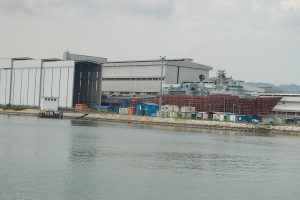Boustead Holdings is a diversified holding company headquartered in Malaysia, with interests in palm oil, real estate, pharmaceuticals, finance, and heavy industry, specifically defense manufacturing. Until this year, Boustead Holdings was 75 percent owned by Lembaga Tabung Angkatan Tentera, a pension fund for the Malaysian Armed Forces. The firm has a vast web of subsidiaries, investments, joint ventures, and associates spread throughout the Malaysian economy.
One of them is called Boustead Heavy Industries Corp (BHIC). In 2011, the Ministry of Defense awarded BHIC a RM 9 billion ($1.9 billion) contract for six littoral combat ships (LCSs), the first of which was meant to be delivered by 2019. To be built in Malaysia by Boustead Naval Shipyard under license from French defense contractor Naval Group, the ships will be the most advanced surface combatants in the Royal Malaysian Navy.
The entire undertaking has been a complete disaster. Twelve years on, and the Malaysian Ministry of Finance is now in negotiations to take full control of Boustead Naval Shipyard, which has essentially been bankrupted by the LCS contract. The shipyard recently received an additional $430 million to simply keep it afloat while trying to salvage the project.
Meanwhile, losses from the LCS program have been eating away at the earnings and equity of the shipyard’s parent company, Boustead Heavy Industries Corp. BHIC had RM 476 million ($101 million) in equity in 2011, when the contract was awarded. By 2022, that equity had shrunk to RM 61 million ($13 million), and the company recorded cumulative after-tax losses of RM 280 million ($59 million) between 2018 and 2022.
In my view, state-owned defense firms do not necessarily need to be profitable. There are many reasons why they might operate at a loss, but as long as they deliver the products they are contracted to there are often good justifications for such losses. Boustead Naval Shipyard, despite heavy losses, has yet to deliver a single ship. The lead ship of the class is now expected to be delivered in 2026, fifteen years after the contract went into effect. The order was also downsized from six to five.
And now the losses piling up at Boustead Heavy Industries have rippled up the ownership chain into the holding company. Boustead Holdings recorded cumulative after-tax losses of RM 2.4 billion ($507 million) between 2018 and 2020 as the heavy industry division dragged down earnings and took large write-offs related to the LCS program. In 2021, earnings started to bounce back thanks to windfall profits in their palm oil business. And in 2022, Boustead Holdings paid a dividend of RM 30 million ($6 million), the first such payment since 2018.
But in 2022 another major subsidiary of Boustead Holdings called Pharmaniaga imploded. Auditors examining Pharmaniaga’s 2022 financial statements have raised doubts about the company’s ability to continue as a going concern which means it is or will soon be insolvent. A restructuring and financial reorganization plan is currently in the works. As a result, Boustead Holdings’ pharmaceutical division posted a loss of RM 583 million ($123 million) in 2022.
While they were apparently willing to eat the losses at Boustead Heavy Industries for the last few years, the pharmaceutical division encountering financial difficulties was too much for Lembaga Tabung Angkatan Tentera and they initiated a 100 percent takeover of Boustead Holdings earlier this year. The company has been delisted from the Malaysian stock exchange, and the pension fund – which is directed by the Ministry of Defense – is now the sole owner.
Despite all the financial turmoil, Boustead Holdings still has considerable value. They ended 2022 with RM 5.3 billion ($1.1 billion) in equity, and have profitable investment and plantation holdings. The problem is that they are supposed to be a steady source of cash flow for a military pension fund. And they have hardly paid any money into that pension fund over the last several years, ironically because a defense procurement project is bankrupting one of their subsidiaries. Financial difficulties at Pharmaniaga made things that much more untenable.
Now the state is taking over, with the Ministry of Finance acquiring Boustead Naval Shipyard and Lembaga Tabung Angkatan Tentera taking Boustead Holdings off the market. Boustead Holdings is also now looking to acquire 100 percent of its plantation subsidiary. By consolidating these holdings under firmer state ownership and control it is believed they can right the ship faster, getting back to the business of generating cash for the military pension fund. Whether that happens or not remains to be seen, but either way it represents an interesting rebalancing of state and market in a major Malaysian holding company.

































